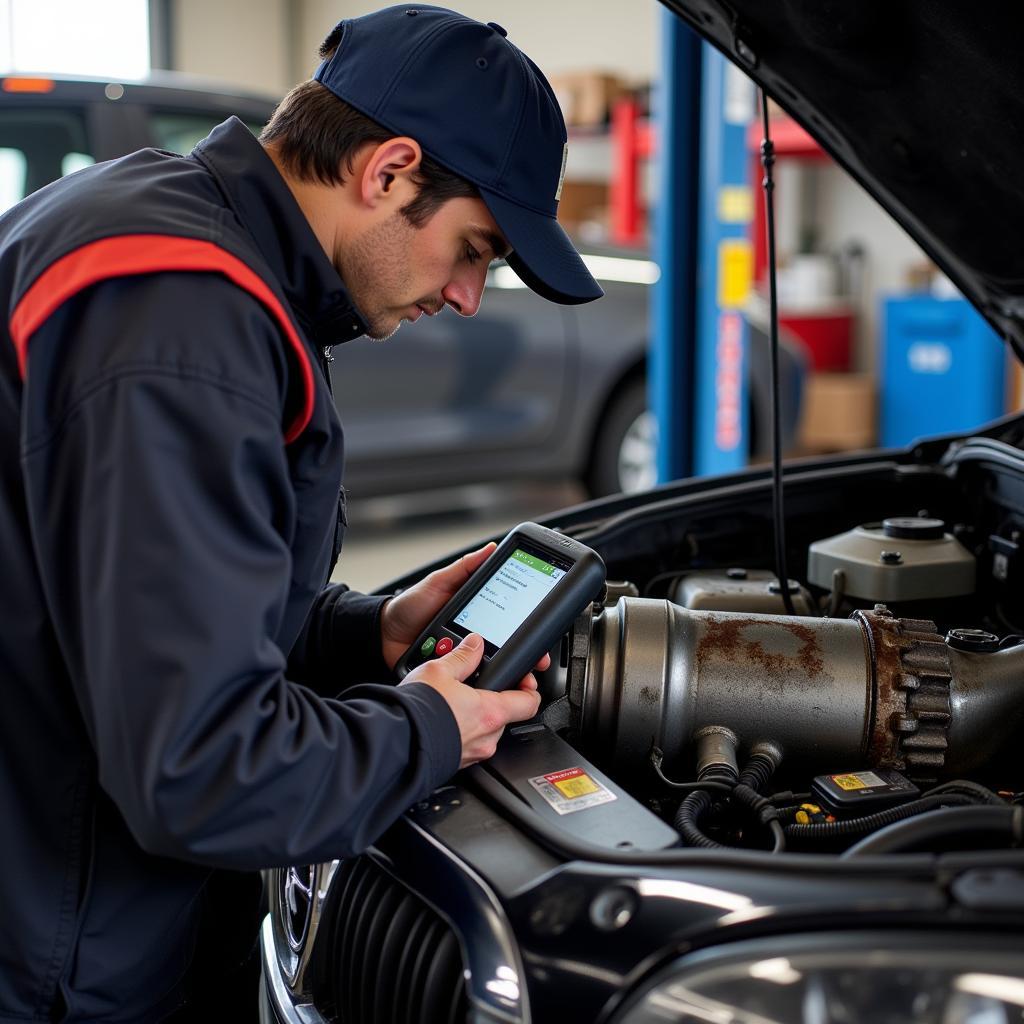A sudden impact, even a seemingly minor one, can absolutely cause transmission problems. Whether you’ve been rear-ended, bumped in a parking lot, or experienced a more serious collision, understanding the potential damage to your transmission is crucial. This article will delve into the intricate relationship between impacts and transmission issues, helping you diagnose, address, and prevent costly repairs.
How Impacts Can Affect Your Transmission
A forceful impact can jolt your car’s transmission in ways you might not immediately notice. The transmission, responsible for transferring power from the engine to the wheels, is a complex system of gears, fluids, and electronic components. A sudden shock can disrupt this delicate balance, leading to a cascade of problems.
Common Transmission Issues After an Impact
- Fluid Leaks: Impacts can damage the transmission pan, seals, or lines, leading to fluid leaks. Low transmission fluid can cause overheating, slipping, and ultimately, transmission failure.
- Shifting Problems: Difficulty shifting gears, delayed engagement, or slipping between gears are all telltale signs of impact-related transmission damage. The force of the collision can misalign or damage internal components, affecting the smooth transition between gears.
- Torque Converter Damage: The torque converter, a vital component connecting the engine and transmission, is susceptible to damage from impacts. Symptoms of a damaged torque converter can include shuddering, vibrations, and decreased acceleration.
- Electronic Malfunctions: Modern transmissions rely heavily on electronic sensors and control modules. An impact can damage these sensitive components, leading to erratic behavior, warning lights, and even complete transmission failure.
Diagnosing Transmission Problems After a Collision
If you’ve been involved in a collision, even a minor one, it’s crucial to have your transmission inspected by a qualified mechanic. Early diagnosis can prevent minor issues from escalating into major, costly repairs.
What to Look For
- Check Engine Light: A illuminated check engine light can indicate a transmission problem, among other issues.
- Unusual Noises: Grinding, whining, or clunking sounds coming from the transmission area warrant immediate attention.
- Leaks: Inspect the area under your car for any signs of transmission fluid leaks. Transmission fluid is typically red or brown and has a slightly sweet odor.
- Driving Performance: Pay attention to any changes in your car’s driving performance, such as difficulty shifting, slipping, or hesitation.
 Mechanic Inspecting Car Transmission
Mechanic Inspecting Car Transmission
Preventing Transmission Damage in a Collision
While you can’t always prevent a collision, you can take steps to minimize the potential damage to your transmission.
- Proper Maintenance: Regular transmission fluid changes and inspections can help identify and address minor issues before they become major problems. A well-maintained transmission is more resilient to damage.
- Safe Driving Practices: Defensive driving techniques, such as maintaining a safe following distance and being aware of your surroundings, can help you avoid collisions altogether.
“A proactive approach to transmission maintenance is the best defense against costly repairs. Regular checks can identify potential problems early on, saving you both time and money.” – John Miller, Certified Automotive Technician
Will a Minor Fender Bender Cause Transmission Problems?
Even a minor fender bender can cause transmission problems, although it’s less common than with more significant impacts. The severity of the damage depends on the force and direction of the impact.
Conclusion
Will Slamming Into A Car Cause Transmission Problems? Absolutely. From fluid leaks and shifting problems to torque converter damage and electronic malfunctions, the impact of a collision can significantly affect your transmission. Regular maintenance, safe driving practices, and prompt inspection after a collision are crucial for preventing and addressing these issues. If you suspect your transmission has been damaged in a collision, don’t hesitate to contact a qualified mechanic. For expert advice and assistance, feel free to connect with us at AutoTipPro. Our phone number is +1 (641) 206-8880 and our office is located at 500 N St Mary’s St, San Antonio, TX 78205, United States.
FAQ
- What is the most common transmission problem after a car accident? Fluid leaks are often the first sign of transmission damage after a collision.
- How much does it cost to fix a transmission after an accident? The cost can vary significantly depending on the extent of the damage, ranging from a few hundred dollars to several thousand.
- Can I still drive my car if I suspect transmission damage? It’s best to avoid driving your car if you suspect transmission damage to prevent further problems.
- How can I prevent transmission damage in a collision? Proper maintenance and safe driving practices are the best preventative measures.
- What should I do if my check engine light comes on after an accident? Have your car inspected by a qualified mechanic immediately.
- Can a rear-end collision cause transmission problems? Yes, a rear-end collision can absolutely cause transmission problems.
- What are the signs of a damaged torque converter? Shuddering, vibrations, and decreased acceleration are common signs of a damaged torque converter.




Leave a Reply